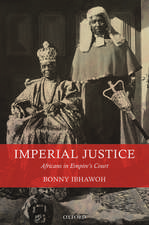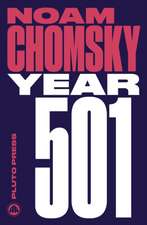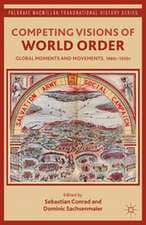Edge of Empire: The British Political Officer and Tribal Administration on the North-West Frontier 1877–1947
Autor Christian Tripodien Limba Engleză Hardback – 28 mai 2011
| Toate formatele și edițiile | Preț | Express |
|---|---|---|
| Paperback (1) | 260.93 lei 6-8 săpt. | |
| Taylor & Francis – 14 oct 2024 | 260.93 lei 6-8 săpt. | |
| Hardback (1) | 1061.81 lei 6-8 săpt. | |
| Taylor & Francis – 28 mai 2011 | 1061.81 lei 6-8 săpt. |
Preț: 1061.81 lei
Preț vechi: 1294.89 lei
-18% Nou
Puncte Express: 1593
Preț estimativ în valută:
203.20€ • 211.36$ • 167.76£
203.20€ • 211.36$ • 167.76£
Carte tipărită la comandă
Livrare economică 14-28 aprilie
Preluare comenzi: 021 569.72.76
Specificații
ISBN-13: 9780754668381
ISBN-10: 075466838X
Pagini: 268
Dimensiuni: 156 x 234 x 16 mm
Greutate: 0.66 kg
Ediția:New.
Editura: Taylor & Francis
Colecția Routledge
Locul publicării:Oxford, United Kingdom
ISBN-10: 075466838X
Pagini: 268
Dimensiuni: 156 x 234 x 16 mm
Greutate: 0.66 kg
Ediția:New.
Editura: Taylor & Francis
Colecția Routledge
Locul publicării:Oxford, United Kingdom
Public țintă
AcademicNotă biografică
Christian Tripodi, King's College London, at the Joint Services Command and Staff College, UK.
Cuprins
Acknowledgments; Introduction; Chapter 1 Who were the Politicals?; Chapter 2 Forward with Hearts and Minds, 1877–92; Chapter 3 The North-West Frontier, 1892–1900; Chapter 4 Reform and Consolidation, 1900–1914; Chapter 5 War, Rebellion and the ‘Modified Forward’ Policy, 1914–24; Chapter 6 Interregnum, 1924–30; Chapter 7 Frontier Strategy, 1930–39; Chapter 8 Toward the End, 1939–47; Conclusion;
Recenzii
'This book is a valuable history of a hitherto largely romanticized, but little understood part of the imperial edifice of British India. Tripodi’s deft handling of the subject matter makes the work both highly accessible and highly entertaining.' American Historical Review 'In sum, this is a well-researched and lucidly written monograph... The writer is to be congratulated on producing such an interesting and informative text, one which is worthy of a wide audience.' English Historical Review 'Christian Tripodi, already the ’go-to guy’ on imperial frontier politics, points out in his excellent and prodigiously well-researched book Edge of Empire that one should be wary of reading across too readily from one historical period to another... Nonetheless, beside the politicals, to which this book gives such vivid intellectual life, our current crop of experts seems as peripheral as highly paid adventure tourists. If current practitioners of politics in Afghanistan sincerely wish to be more than that, they should make space in their packs for this fine book - one that is also a really good read.' The RUSI Journal 'Christian Tripodi offers no solutions, but does offer credible views which support the contention that the British experience is relevant and can offer lessons to those dealing with today’s threats... Tripodi has a demonstrable and commendable policy of sourcing all his assertions, and the depth of his research is beyond reproach.' Asian Affairs 'Tripodi’s archival research is extensive... The book is enriched by highly detailed footnotes that provide a trove of additional information. He provides a detailed study of a complicated subject and succeeds in producing a work accessible to nonspecialists that simultaneously presents arguments specialists will find intriguing.' The Historian 'This fascinating book is of added interest because many of the methods of governance it discusses were subsequently used by the government of Pakistan in the Khy
Descriere
Created in the late eighteenth century by the East India Company to manage relations with the princely rulers of the Indian States, political officers developed into a mechanism by which Britain could manage remote territories through relations with local power brokers. In this study, the role of the political officer on the Western Frontier of India between 1877-1947 is examined in detail. Providing an account of the personalities and mechanisms of colonial influence/tribal control in what remains one of the most unstable regions in the world today, the book charts the successes and failures, dangers and attractions, as well as the political legacy, of a system of power by proxy.















